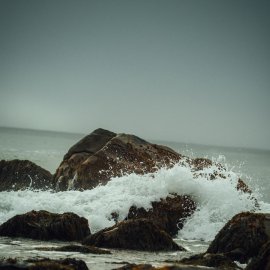RESCUE, part 15: Technology Food and Health
-
English
-
ListenPause
[intro music]
Welcome to World Ocean Radio…
I’m Peter Neill, Director of the World Ocean Observatory.
“As the largest traded food commodity in the world, seafood provides sustenance to billions of people worldwide. More than 3 billion people in the world rely on wild-caught and farmed seafood as a significant source of animal protein.” So states the World Wildlife Fund, an assertion echoed by other organizations and UN entities, the only variable being whether that significant source is 10 or 20% of necessary consumption. Now, add the continuing alarms raised over unsustainable and illegal seafood harvest and you have a health crisis already in the making.
The problem can be confronted by treaty, regulation with enforcement against the national and private enterprise that flaunts this reality through indifference and overt practice in defiance of global public awareness, some isolated prosecution, some anecdotal confiscation and destruction of vessels and imprisonment of outlaw fishers. The consumption paradigm rules: what I need I take, what others need has no relevant meaning. This compulsion is not unique to fishing, or fossil fuel and toxin production, or plastic waste, or national interest, or personal behavior – the collective outcome threatens species, ecosystems, coastal areas and communities, trade and economic viabilities, and international relations. This relentless harvest of fisheries and more is the explanation for food insecurity as an international reality and point of confusion and conflict.
If we cannot contain or transform this social behavior, we will need to look elsewhere for the protein required, and technology as an instrument of change has a respondent, urgent purpose. The nexus between agriculture and aquaculture pertains in that these two are manifestations of food production to scale, farming on land and sea, each with challenges as individual processes, each with synergies toward harmonic outcome. Both demand respect for the natural environments that sustain them. Both face problems of waste and corruption of local utility. Both have disruptive social and political consequences. Both have international implication for finance and trade. Both can create the paradoxical dilemma of destroying today the very thing that sustains us tomorrow. Sound familiar?
But both also have an interest in reformed application and best practice. Both can transform manufacturing processes and waste recycling toward alternative outcomes. Both can adopt alternative energy production, use biofuels, integrate distribution systems, reduce additives, modify production and packaging, institute labor reforms, and integrate their processes under a concept of environmental conservation, sustainability, political affirmation, social justice, community development, and successful provision of harvest and health worldwide.
This is no impossible dream. Technology is aiding some of this change, through practical invention, shared opportunity, access to more efficient accounting and traceability, and new research and discovery of less destructive processing and ingredients, and more constructive performance and products that pertain more directly to a world that can no longer afford unlimited consumption of essential resources, can no longer ignore the poisoned ground and water created, can no longer accommodate the injustice as measured in individual and community decline, and local, national, and international unrest.
If we can think of agriculture and aquaculture as a social practice combined, with value not measured by calculations indifferent to responsible use and human consequence; if we can think of return on this value as cultural beyond commercial, of technological innovation beyond the short-cut and get-rich-quick mentality that characterizes venture, beyond the past and toward a path to the future, we would make a great leap forward, through applied technology, secure and adequate food supply, and a revival of physical, psychological, and political health, toward the realization of RESCUE: R renewal; E for environment; S for society; C for collaboration; U for understanding; and E for engagement.
We will discuss these issues, and more, in future editions of World Ocean Radio.
[outro music]
This week we continue the multi-part RESCUE series with the topic of seafood consumption. While more than 3 billion people worldwide rely on wild-caught and farmed seafood as a significant source of animal protein, unsustainable and illegally caught seafood harvest threatens a major health crisis if we do not confront the issue through regulation and enforcement of best practice, change in social behavior and consumption, and new technological innovations toward a sustainable future.
About World Ocean Radio
5-minute weekly insights dive into ocean science, advocacy and education hosted by Peter Neill, lifelong ocean advocate and maritime expert. Episodes offer perspectives on global ocean issues and viable solutions, and celebrate exemplary projects. Available for syndicated use at no cost by college and community radio stations worldwide.
Image
Photo by Tim Foster on Unsplash
@timberfoster
- Login to post comments



